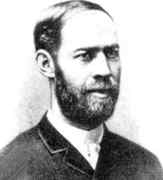Person: Hertz, Heinrich

Heinrich Hertz was a German physicist and mathematician best known for his discovery of what became known as wireless waves.
Mathematical Profile (Excerpt):
- Gustav Hertz was a Jew who converted to become a Lutheran.
- For ten years Hertz studied at Richard Lange's school.
- Hertz spent the year 1875-76 in Frankfurt where he gained practical experience in the building industry and also studied for the state examinations in engineering.
- The university by contrast promised a life of never-ending study and research, one that suited Hertz's scholarly, idealistic tastes; he knew above all he wanted to be a great investigator.
- Hertz matriculated at the University of Munich in 1877 and spent the first semester gaining the necessary background in mathematics.
- Immediately, despite only one year of university study behind him, Hertz wanted to start research.
- A prize had been announced by the Philosophy Faculty for the solution of an experimental problem concerning electrical inertia and Hertz was very keen to enter.
- The prize had been proposed by Helmholtz and, despite Hertz's lack of experience, he realised his great potential and offered Hertz a room in his Physical Institute and considerable support in directing Hertz to the background literature.
- Helmholtz now suggested that Hertz work on the prize topic proposed by him for the Berlin Academy of Sciences.
- This sounded interesting to Hertz yet wanted to progress rapidly in his chosen area and felt that he could not embark on a project likely to take around three years.
- During the three years 1880-83 that Hertz worked at the Berlin Physical Institute, he wrote fifteen papers on a variety of topics.
- Hertz had to decide on the best way to progress his career.
- He was already in the best place to undertake research in physics and working with Helmholtz who, Hertz felt, was the best physicist in the world.
- It was in Kiel that Hertz first showed his strength as a lecturer.
- It is concluded that Hertz's idea of 'air waves' belongs at the very end of this process, and was mainly attained through experimental hints found within Helmholtz's theoretical framework.
- Now Hertz saw his discovery as merely a step towards a deeper understanding of Maxwell's theory.
- He certainly did not foresee the incredible applications which, after Marconi read Hertz's paper and saw its practical application, would transform communication and entertainment.
- Hertz needed new apparatus to prove Maxwell's theory of the existence of electromagnetic waves and he worked his way towards this which was finally achieved in 1888.
- During four years in Karlsruhe Hertz published nine papers.
- As always, Hertz thought deeply about the consequences of accepting the positions.
- Helmholtz told Hertz that he would make sure he had a top quality laboratory in Berlin but still Hertz did not feel it was the right move.
- When Hertz moved to Bonn in the spring of 1889 not only did he move into Clausius's chair but he also moved into his house.
- Hertz was a fervent believer in the aether and during this work proposed identifying electromagnetic fields in free space with polarization of the aether.
- Even before moving to Bonn, Hertz suffered the first signs of his serious health problems.
- In mechanics Hertz followed Kirchhoff and considered only length, time and mass as the fundamental entities, force being a derived concept.
- Those taking this historical approach have focused almost exclusively on the connection between Wittgenstein's picture theory of linguistic meaning and the epistemology of mental pictures developed by the physicist Heinrich Hertz in the introduction to his 'Die Prinzipien der Mechanik' Ⓣ(Principles of mechanics), published in 1894.
- They have taken their cue, quite naturally, from Wittgenstein, who refers twice to Hertz's work in the 'Tractatus logico-philosophicus' Ⓣ(Tract on philosophical logic).
- In addition to Hertz, but to a much lesser extent, they have also discussed the role played by Ludwig Boltzmann's philosophical writings in Wittgenstein's intellectual development.
- While analysing and stressing the importance of Hertz's influence on Wittgenstein, however, they have misconstrued the chronological and substantive relationship between Hertz's philosophy and the philosophical writings and ideas of Boltzmann.
Born 22 February 1857, Hamburg, Germany. Died 1 January 1894, Bonn, Germany.
View full biography at MacTutor
Tags relevant for this person:
Origin Germany
Mentioned in:
Parts: 1
Thank you to the contributors under CC BY-SA 4.0! 

- Github:
-

- non-Github:
- @J-J-O'Connor
- @E-F-Robertson
References
Adapted from other CC BY-SA 4.0 Sources:
- O’Connor, John J; Robertson, Edmund F: MacTutor History of Mathematics Archive
